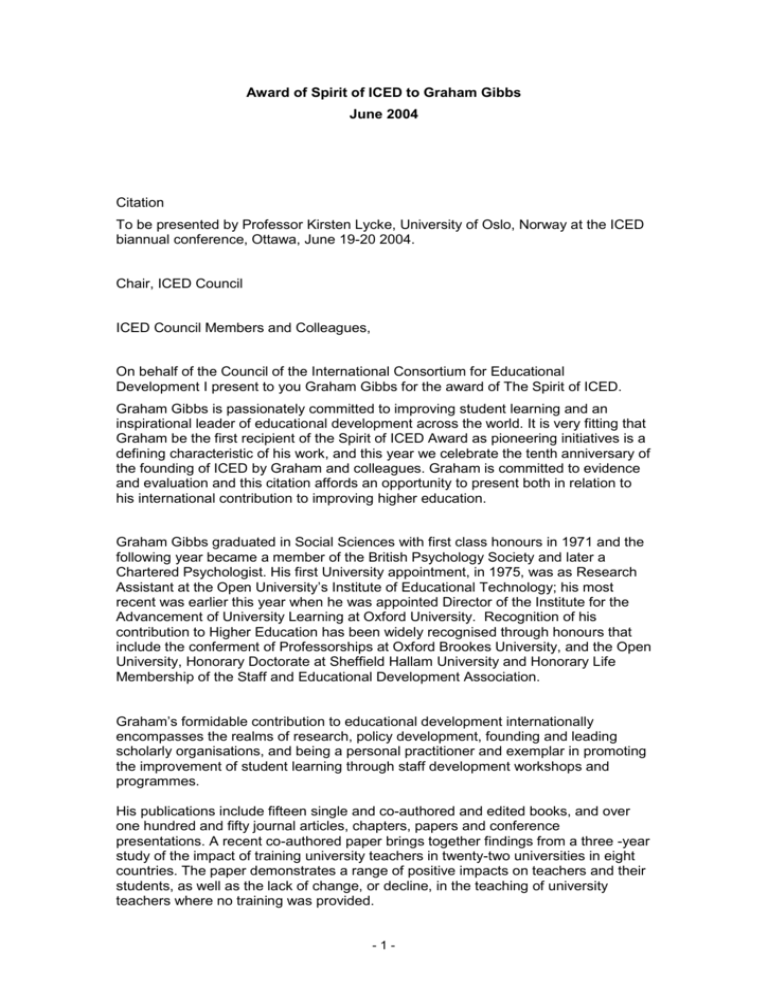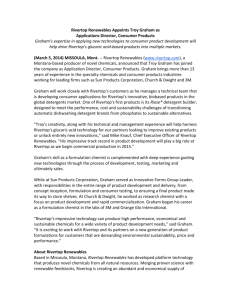Graham Gibbs, 2004 - The International Consortium for Educational
advertisement

Award of Spirit of ICED to Graham Gibbs June 2004 Citation To be presented by Professor Kirsten Lycke, University of Oslo, Norway at the ICED biannual conference, Ottawa, June 19-20 2004. Chair, ICED Council ICED Council Members and Colleagues, On behalf of the Council of the International Consortium for Educational Development I present to you Graham Gibbs for the award of The Spirit of ICED. Graham Gibbs is passionately committed to improving student learning and an inspirational leader of educational development across the world. It is very fitting that Graham be the first recipient of the Spirit of ICED Award as pioneering initiatives is a defining characteristic of his work, and this year we celebrate the tenth anniversary of the founding of ICED by Graham and colleagues. Graham is committed to evidence and evaluation and this citation affords an opportunity to present both in relation to his international contribution to improving higher education. Graham Gibbs graduated in Social Sciences with first class honours in 1971 and the following year became a member of the British Psychology Society and later a Chartered Psychologist. His first University appointment, in 1975, was as Research Assistant at the Open University’s Institute of Educational Technology; his most recent was earlier this year when he was appointed Director of the Institute for the Advancement of University Learning at Oxford University. Recognition of his contribution to Higher Education has been widely recognised through honours that include the conferment of Professorships at Oxford Brookes University, and the Open University, Honorary Doctorate at Sheffield Hallam University and Honorary Life Membership of the Staff and Educational Development Association. Graham’s formidable contribution to educational development internationally encompasses the realms of research, policy development, founding and leading scholarly organisations, and being a personal practitioner and exemplar in promoting the improvement of student learning through staff development workshops and programmes. His publications include fifteen single and co-authored and edited books, and over one hundred and fifty journal articles, chapters, papers and conference presentations. A recent co-authored paper brings together findings from a three -year study of the impact of training university teachers in twenty-two universities in eight countries. The paper demonstrates a range of positive impacts on teachers and their students, as well as the lack of change, or decline, in the teaching of university teachers where no training was provided. -1- An Australian colleague and former ICED Council Member states of Graham’s work: ’His publications had amazing penetration across the higher education sector in Australia and in many other countries that I visited. He is one of the pioneers of educational development, one of the ‘definers’ of what it is all about.’ Graham has also founded scholarly centres and organisations which have had a profound influence on staff and educational development, examples being the Oxford Centre for Staff Development The Centre for Higher Education Practice at the Open University and, of course, the International Consortium for Educational Development. The Oxford Centre for Staff Development was extremely influential and prolific in its workshops, conferences, consultations, and publications, which offered practical strategies for educational change grounded on a solid conceptual base and impressive and eclectic scholarship. Graham was enormously successful at attracting outside funding, and used this as a form of leverage for disseminating strategies for development and change across Europe and beyond. For example, the “Teaching Large Classes” initiative was used in institutions across the UK, and the idea was also adopted in many other countries including here in Canada. It was at Oxford that Graham first conceived the idea of an international organisation for educational development, and invited a small group of developers to England in the summer of 1993 to discuss the idea. This was the beginnings of ICED and it was typical of Graham’s flexibility that the original blueprint evolved so considerably to became the organisation that exists today, and which has steadily expanded over the past decade. In terms of national policy and strategy development in the UK, Graham’s contribution has been immense. His combination of strategic vision with a use of detailed description has inspired important changes in policy and practice. He was seconded to the Higher Education Funding Council for England to review all former efforts to improve higher education teaching through nationally organised initiatives. His report, ’Institutional Learning and Teaching Strategies’, published in 1999, led to the establishment of the national Teaching Quality Enhancement Fund which has enabled and promoted strategic educational development within the sector and played a key role in increasing the recognition of staff and educational developers as significant agents of positive change. The Director of the Staff Development Centre at Colombo University, and ICED Council Member, evaluates Graham’s contribution thus: ‘Graham’s sincerity in imparting educational development to embrace Developing Countries became evident in the total commitment he displayed when working with me to develop and conduct the first Training the Trainers programme for Sri Lankan academics five years ago. His uniqueness in promoting and supporting Developing Countries extended to a characteristic outcomes-based approach, where he drew in Developing Countries into collaborative North-South research programmes, opening our eyes to tools for use in developing higher education in Developing Countries’. The Director of Learning and Teaching at the Higher Education Funding Council for England, and former Co-Chair of SEDA and ICED Council Member, insightfully and eloquently captures Graham’s achievement: ‘His energy is boundless, and not only on a bike! From his extensive research and practice and travelling and networking around the country, across Europe and the world, he has brought rich experience – and has laid before us exemplars of good -2- practice (and its opposite) in a way that has captured the imagination of policy makers, Vice-Chancellors and teachers, as well as educational developers. He is critical, tenacious, insightful, provocative, eloquent and wise. He is at once the grit in the oyster which initiates change, and the guide at the door who can indicate the way ahead. He has always been on the side of students and has connected people across cultures and territories in ways that facilitate international development – the true Spirit of ICED.’ It is fitting today, here in Canada, to conclude this Citation with the views of a cofounder of ICED and eminent Professor Emeritus, from Queen’s University, Canada. ‘Graham Gibbs is an enthusiast, pragmatist, iconoclast, entrepreneur, traveller, oenophile and sometime bon viveur, leader and risk-taker, an introvert who simulates extraversion to perfection I can think of no-one who has done more to foster the aims and spirit of ICED and to encourage the enhancement of teaching and learning in higher education institutions across the world.’ Colleagues it is my pleasure to present the award of Spirit of ICED to Graham Gibbs. -3-








